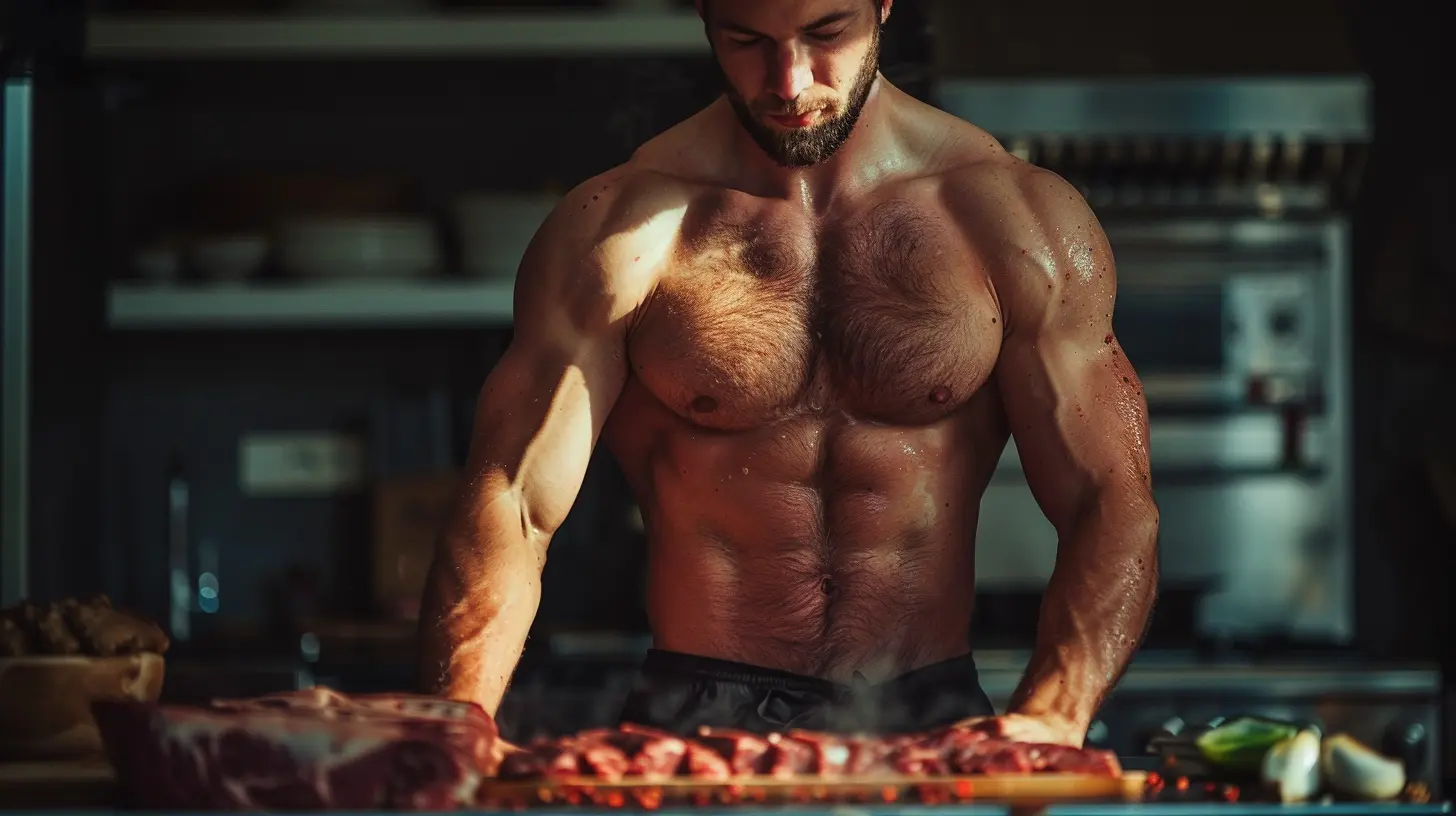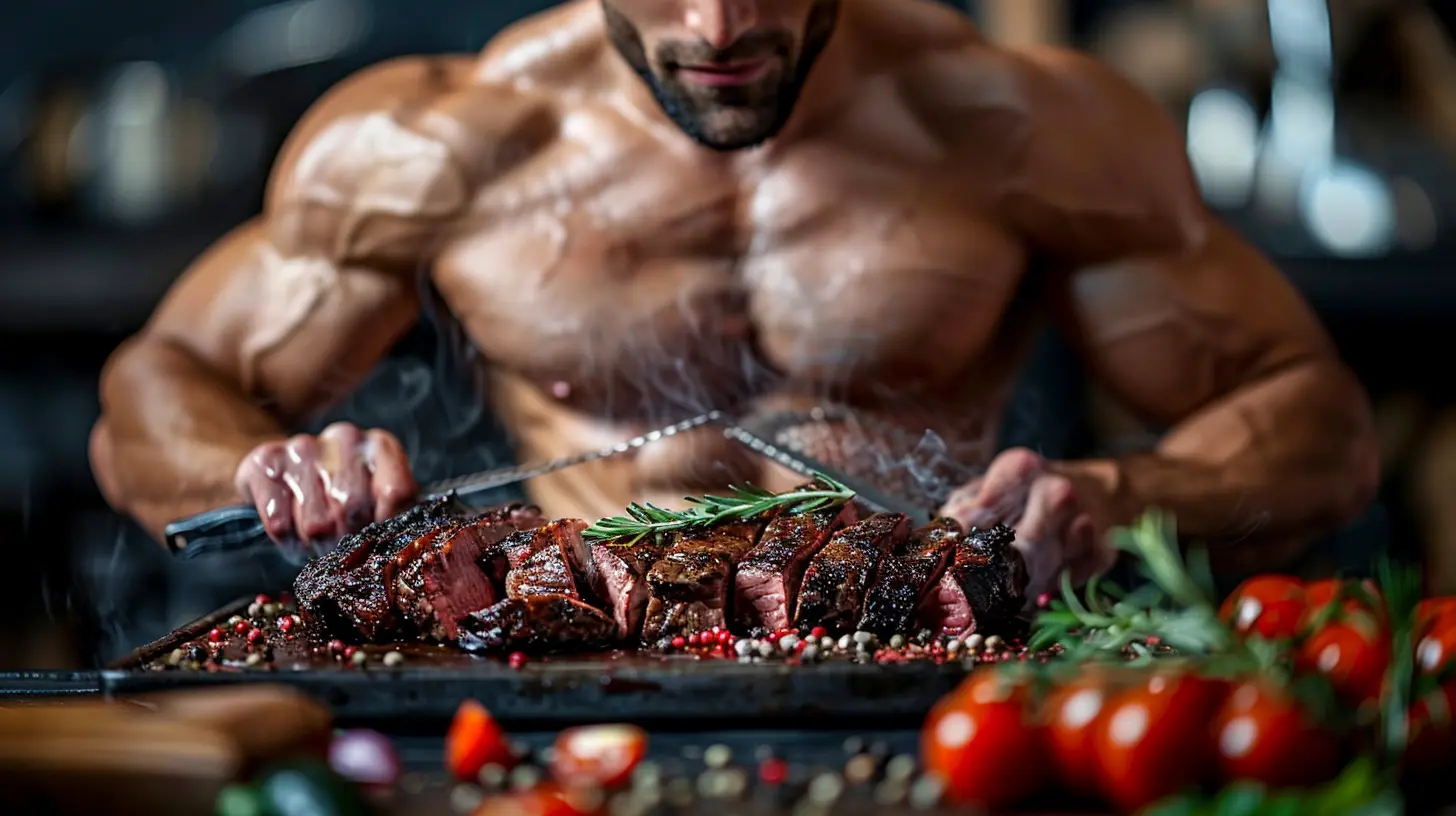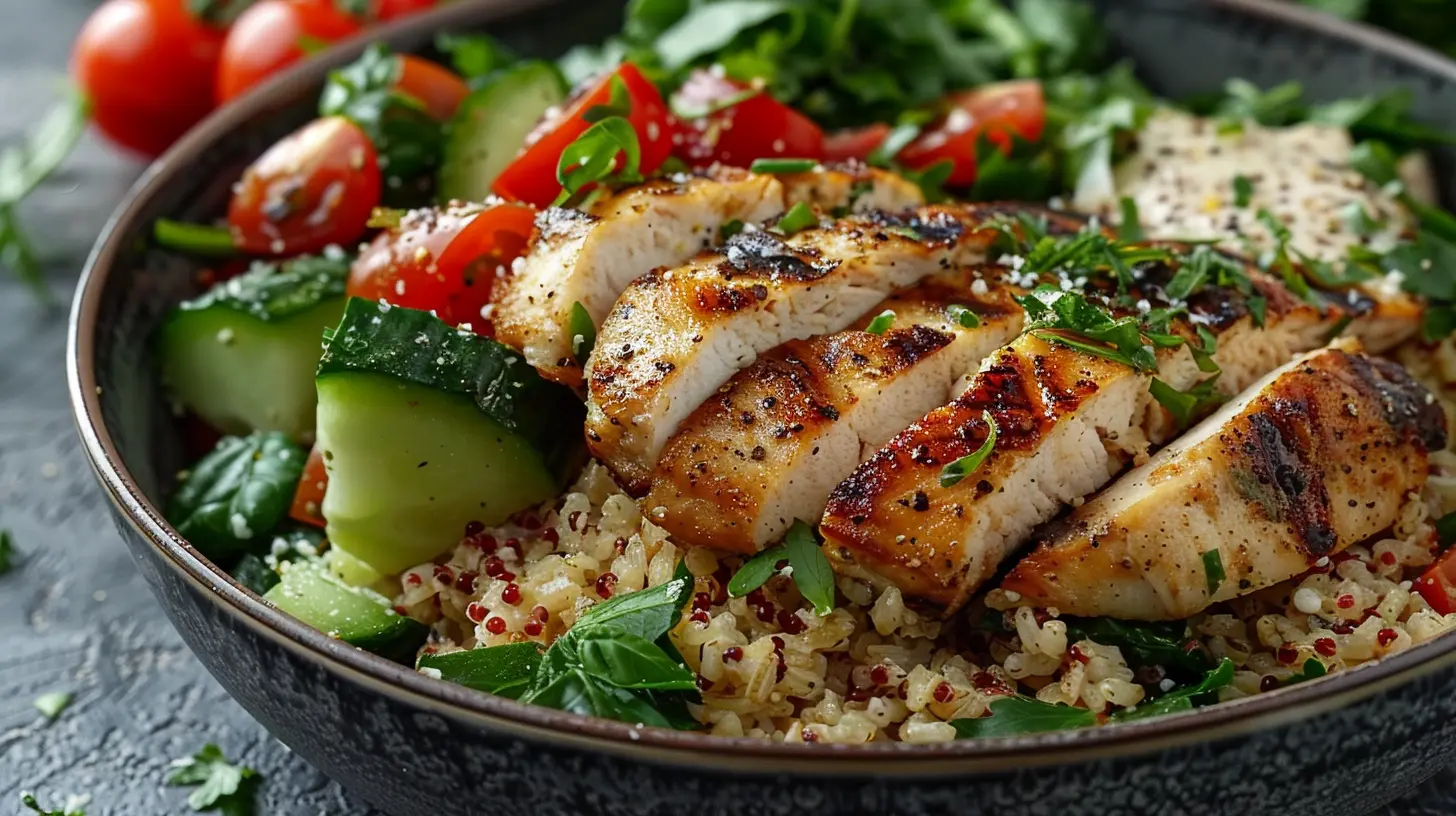Muscle Building Meal Plans for Athletes of All Levels
19 December 2024
Are you an athlete looking to build muscle but feel lost when it comes to planning your meals? Maybe you’ve tried some meal plans before, only to find they were too complicated, boring, or didn’t deliver the results you wanted. Well, you’re not alone! Building muscle isn’t just about lifting weights or doing high-intensity workouts—it’s also about fueling your body with the right nutrients.
In this guide, I’m going to break down muscle-building meal plans in a way that’s easy to follow, effective, and tailored to athletes of all levels. Whether you’re a beginner, intermediate, or an advanced athlete, this article will give you a clear roadmap to eat your way to stronger, leaner muscles. 
Why Is Nutrition So Important for Muscle Building?
When it comes to building muscle, your diet is just as important (if not more so) than the work you put in at the gym. Think of your body like a car—exercise is the engine, but food is the fuel that keeps everything running smoothly. Without the right balance of macronutrients (protein, carbs, and fats) and micronutrients (vitamins and minerals), your muscle-building efforts can hit a standstill.Here’s the deal: To build muscle, you need a caloric surplus—eating more calories than your body burns in a day. But it’s not about stuffing yourself with pizza or donuts (sorry, I know they’re tempting!). It’s about eating quality calories that provide your body with the nutrients it needs to repair and grow muscle tissue. 
The Macronutrient Breakdown
Before diving into meal plans, let’s talk macronutrients. Yes, I know it sounds a bit technical, but trust me, this is the foundation of your muscle-building journey.1. Protein (The Muscle Builder)
Protein is the star of the muscle-building show. Without enough protein, your muscles won’t have the building blocks they need to repair and grow. Aim for about 1.6–2.2 grams of protein per kilogram of body weight per day.Some excellent sources of protein include:
- Chicken breast
- Turkey
- Eggs
- Greek yogurt
- Tofu/tempeh
- Lean beef
- Fish (like salmon or tuna)
- Protein powders
2. Carbs (The Energy Provider)
Carbs are your body’s primary energy source. When you eat carbs, your body stores them as glycogen in your muscles, which fuels your workouts. Don’t skip them! Aim for 4–6 grams of carbs per kilogram of body weight per day, depending on your activity level.Some great carb sources include:
- Sweet potatoes
- Brown rice
- Quinoa
- Oats
- Whole-grain bread
- Beans and lentils
- Fruits (like bananas and berries)
3. Fats (The Hormonal Supporter)
Healthy fats are essential for hormone production, which plays a huge role in muscle growth. They’re also a good source of long-lasting energy. Aim for 0.8–1 gram of fat per kilogram of body weight per day.Healthy fat sources:
- Avocado
- Nuts and seeds
- Olive oil
- Fatty fish (like salmon)
- Coconut oil 
Meal Plans for Athletes of All Levels
Now that you’ve got the basics down, let’s dive into the fun part—meal plans! These plans are designed to provide enough calories, macronutrients, and variety to fuel your muscle-building goals.Beginner Athlete Meal Plan
If you’re just starting out, the focus is on building consistent habits. Don't worry—these meals are simple, quick, and easy to prep.Meal Plan Example:
- Breakfast:- 2 scrambled eggs
- 1 slice of whole-grain toast
- 1 banana
- 1 cup of black coffee or green tea
- Snack:
- 1 small handful of almonds (about 20)
- 1 apple
- Lunch:
- Grilled chicken breast (100g)
- 1 cup of brown rice
- Steamed broccoli (1 cup)
- Snack:
- 1 scoop of protein powder mixed with water or almond milk
- 1 tablespoon of peanut butter
- Dinner:
- Baked salmon (150g)
- Roasted sweet potato wedges (150g)
- Mixed greens salad with olive oil dressing
- Evening Snack:
- A small bowl of Greek yogurt (150g) topped with berries
Intermediate Athlete Meal Plan
If you’ve been training for a while and have a bit of muscle already, this plan focuses on adding variety and calorie density to keep you progressing.Meal Plan Example:
- Breakfast:- 3 scrambled eggs with spinach and mushrooms
- 1 slice of whole-grain bread
- 1 orange
- Snack:
- 1 protein bar (look for one with minimal sugar and at least 20g of protein)
- Lunch:
- Ground turkey (150g) stir-fried with mixed peppers
- 1 cup of quinoa
- Side of avocado slices
- Snack:
- Cottage cheese (100g) with 1 tablespoon of honey
- A few walnuts
- Dinner:
- Grilled steak (200g)
- 1 cup of mashed sweet potatoes
- Steamed asparagus
- Evening Snack:
- Oats mixed with almond milk, 1 scoop of protein powder, and a sprinkle of cinnamon
Advanced Athlete Meal Plan
For seasoned pros, the focus is on precise food choices, higher calorie intake, and nutrient timing.Meal Plan Example:
- Breakfast:- 4 scrambled eggs, sautéed in coconut oil, with spinach
- 1 cup of oatmeal topped with blueberries and a drizzle of almond butter
- Snack:
- 1 protein shake with a scoop of protein powder, almond milk, and 1 banana
- A handful of mixed nuts
- Lunch:
- Grilled chicken breast (200g)
- 1 serving of brown rice or quinoa
- Steamed green beans
- Snack (Pre-workout):
- A slice of whole-grain bread with peanut butter
- 1 small banana
- Post-Workout Snack:
- Protein shake with whey protein and a handful of fast-digesting carbs (like gummy bears or rice cakes)
- Dinner:
- Baked cod (200g)
- 1 cup of roasted vegetables (zucchini, carrots, sweet potato)
- 1 side of avocado slices
- Evening Snack:
- Cottage cheese topped with a sprinkle of flaxseed 
Hydration and Supplementation
Don’t forget about water—hydration is key to muscle recovery and performance. Aim for at least 3 liters a day, especially if you’re sweating buckets during training.As for supplements, you don’t need a ton, but a few can give you a boost:
- Protein Powder: Helps you hit your protein goals.
- Creatine: Improves strength and muscle recovery.
- BCAAs: May reduce muscle soreness and fatigue.
- Multivitamins: Fills in gaps in your micronutrient intake.
Tips for Success
1. Meal Prep is Your Best Friend: Spend a couple of hours on the weekend prepping meals so you’re not tempted to grab unhealthy options during the week.2. Track Your Calories: Use an app like MyFitnessPal to ensure you’re eating enough (but not too much).
3. Be Patient: Muscle building takes time—it’s a marathon, not a sprint. Stay consistent, and the results will come.
Conclusion
Building muscle is as much about what you eat as it is about how you train. By following these meal plans and sticking to nutrient-dense, calorie-packed foods, you’ll be well on your way to achieving your muscle-building goals. Whether you’re a beginner, an intermediate, or an advanced athlete, there’s no one-size-fits-all approach—so don’t be afraid to tweak these plans to fit your needs and preferences. Now, it’s time to hit the kitchen and start fueling your way to stronger, more powerful muscles!all images in this post were generated using AI tools
Category:
Sports NutritionAuthor:

Madeline Howard
Discussion
rate this article
11 comments
Josie McBride
Unlock your strength potential with these meal plans! Fuel your body right, and watch your muscles transform—no excuses, just results. Let’s get to work!
April 6, 2025 at 4:21 AM

Madeline Howard
Thank you! Fueling your body properly is key to muscle transformation—let's elevate our game together!
Odessa Castillo
Unlock your potential: discover the hidden secrets behind muscle-building meals for peak performance.
March 31, 2025 at 2:59 AM

Madeline Howard
Thank you! Excited to share valuable insights on optimal meal plans that can help athletes maximize their muscle-building potential!
Theodore Hines
Balanced nutrition is key; avoid excess protein for optimal health.
February 2, 2025 at 5:25 PM

Madeline Howard
Absolutely! A balanced approach to nutrition, including moderate protein intake, is essential for supporting muscle growth and overall health in athletes.
Fiona Vance
Great article! I appreciate the comprehensive meal plans tailored for athletes at every level. It’s essential to fuel our bodies properly for optimal performance, and the insights provided here are incredibly useful for anyone dedicated to muscle building. Thank you!
January 25, 2025 at 4:47 PM

Madeline Howard
Thank you for your kind words! I'm glad you found the meal plans helpful for fueling performance. Happy training!
Maris McGee
Great insights! This article really simplifies meal planning for athletes. Thank you for sharing!
January 16, 2025 at 5:32 AM

Madeline Howard
Thank you for your kind words! I’m glad you found the article helpful for meal planning. Happy training!
Tamara Lewis
Great insights! A well-structured meal plan is key for athletes. Remember, nutrition fuels your progress—embrace these strategies for success!
January 10, 2025 at 5:26 AM

Madeline Howard
Thank you! I'm glad you found the insights helpful. Nutrition is indeed vital for optimal performance and muscle growth.
Jinx Pope
Fuel your strength with these delicious meal plans! Perfect for athletes ready to thrive and grow!
January 7, 2025 at 3:31 AM

Madeline Howard
Thank you! We're excited to provide meal plans that help athletes fuel their performance and achieve their goals!
Issac Perez
Great insights! These meal plans are perfect for fueling performance and maximizing gains. Can’t wait to try them out! 💪🥗
December 31, 2024 at 6:08 AM

Madeline Howard
Thank you! I'm glad you found the meal plans helpful. Enjoy trying them out and fueling your performance! 💪🥗
Emmeline McCartney
Great insights! These meal plans are essential for maximizing muscle growth and athletic performance.
December 24, 2024 at 5:42 PM

Madeline Howard
Thank you! I'm glad you found the meal plans helpful for enhancing muscle growth and performance.
Bernadette Mendoza
Fuel your strength, unleash greatness!
December 20, 2024 at 5:46 AM

Madeline Howard
Absolutely! Proper nutrition is key to maximizing strength and reaching your full potential. Let's fuel that greatness!
Sylas Hodge
This article offers valuable insights into tailored meal plans for athletes. It effectively balances nutrition and muscle-building strategies, making it a must-read for all.
December 19, 2024 at 5:35 PM

Madeline Howard
Thank you for your positive feedback! I'm glad you found the meal plans helpful for athletes.
MORE POSTS

Core-Strengthening Exercises That Don’t Require a Gym

Skin Detox: Does It Work and How to Do It Right

Exploring the Latest Advances in Diabetes Research

Workouts Designed for Aging Muscles and Joints

Gluten-Free Cooking with Minimal Ingredients: Simplified Ideas

Engage Your Entire Body with Kettlebell Workouts

Post-Workout Recovery Strategies to Build Strength

Supporting a Healthy Heart: Best Ingredients for Your Smoothie